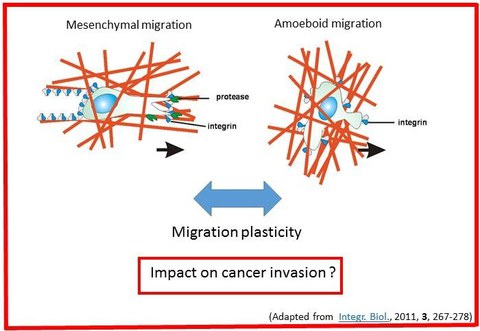Aug 23, 2017
New prospects on the spread of tumours:
Dresden and Heidelberg scientists identify the adaptability of cancer cells as a possible key factor
Scientists of Technische Universität Dresden, the University of Applied Sciences HTW Dresden and the Max Planck Institute for Medical Research Heidelberg have gained new prospects on the invasion mechanism of malignant tumours using mathematical models and computer simulations. In cancer therapy, the prevention of tumour spread is one of the greatest challenges.
Cancer cells are able to change their micro- environment physico-chemically and adapt their movement behaviour according to the new conditions. This is where the researchers have found an appropriate solution: Using a mathematical model, they investigated how diverse and complex environments affect the spread of the tumour.
To this end, they identified the plasticity, i.e. the adaptability of cancer cells, as a possible key factor. However, this is not automatically beneficial. The tumour can show its adaptability, especially in complex environments. The less complex the environment, the worse cancer cells can spread. This also implies: In vitro experiments that investigate the invasion mechanisms of cancer cells outside the organism, should simulate the actual complex microconditions.
On the basis of their findings, the scientists have not yet developed a new therapy, but a promising theoretical approach for further research aimed at the oppression of cancer cell plasticity.
The research was carried out by a team of scientists led by Prof Andreas Deutsch (TU Dresden, Center for Information Services and High Performance Computing (ZIH)), Department of Innovative Methods of Computing) and Prof Anja Voß-Böhme (HTW Dresden, Faculty of Computer Science / Mathematics) in collaboration with Dr Elisabetta Ada Cavalcanti-Adam (Max Planck Institute for Medical Research, Heidelberg). The results will be published in the scientific journal “Scientific Reports“ on 24 August 2017. The full article is available on the website http://www.nature.com/articles/s41598-017- 09300-3.
We thank the German Research Foundation (Deutsche Forschungsgemeinschaft SFB-TRR79), the German Cancer Aid (Deutsche Krebshilfe) and the Saxon State Ministry for Higher Education, Research and the Arts (SMWK) for their support of this work.
Media enquiries
Prof. Andreas Deutsch (TU Dresden)
Tel.: +49 (0) 351 463-31943

